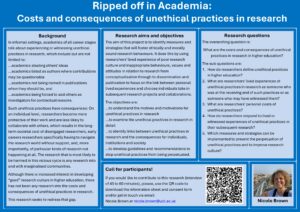
Ripped off in Academia: Costs and Consequences of Unethical Practices in Research
Call for participants! “Ripped off in Academia: Costs and Consequences of Unethical Practices in Research” Background In informal settings, academics of all career stages talk about being ripped off in higher education: they experience or witness unethical practices in research. Unethical practices described include but are not limited to: …academics […]
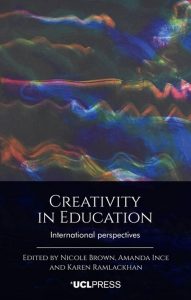
Creativity in Education: International Perspectives
Creativity has become a buzzword across all disciplines in education and across all phases, from early years through to tertiary education. Although the meaning of creativity can change vastly depending on the global educational setting, it is impossible to ignore the applicability and relevance of creativity as an educational tool, philosophical framework and pedagogical approach.
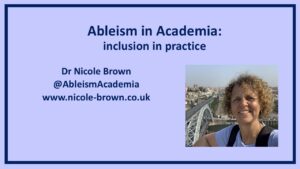
Beyond inclusion: reimagining an anti-ableist higher education
In April 2024, I was asked to deliver a keynote for an international webinar organised by CripLab. CripLab is a research laboratory on crip posthumanities in Santiago, Chile, whose members seek to map the modes of discursive and material production of the norm of dis/ability in Chilean universities that develop […]
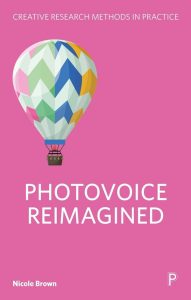
Book launch: Photovoice Reimagined
In this webinar celebrating the publication of her latest book Dr Nicole Brown discusses Photovoice Reimagined.

Book: Photovoice Reimagined
"Photovoice Reimagined" introduces photovoice as a method and photovoice as a framework to enable a more participatory approach to research.

Book: Photovoice Reimagined
Over the past decades, ‘photovoice’ has emerged as a participatory and creative research method in which participants capture and discuss their reality through photographs. This indispensable ‘how-to’ book with exercises and visual aids takes novice and veteran researchers through the practicalities and ethics of applying this approach.
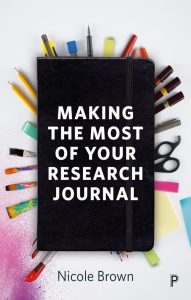
Book: Making the most of your research journal
"Making the most of your research journal" offers guidance and additional resources to make research journaling effective.

Book: Creativity in Education
Creativity has become a buzzword across all disciplines in education and across all phases, from early years through to tertiary education. Although the meaning of creativity can change vastly depending on the global educational setting, it is impossible to ignore the applicability and relevance of creativity as an educational tool, philosophical framework and pedagogical approach.

Objects as metaphors to account for embodiment
QUEST (Qualitative Expertise at Southampton) in collaboration with the National Centre for Research Methods and the South Coast Doctoral Training Partnership organised a webinar on Metaphor and Method. I was one of three keynote speakers presenting “Objects as metaphors to account for embodiment”. Access the video at the NCRM […]
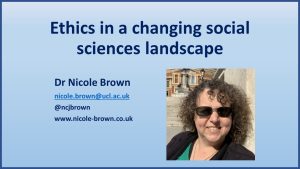
In conversation with REA (Research Ethics Association)
I was asked to an “in conversation with REA”. The Research Ethics Association (REA) brings together academia, industry, and local organisations across all disciplines with the aim of promoting and implementing cross-discipline research ethics, while contributing to ethical practice and research standards. Specifically, I was asked to elaborate on a […]
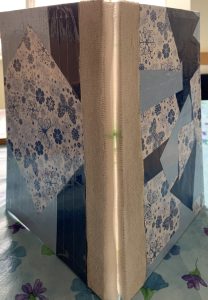
Reflexivity and positionality in social sciences research
This post links to my contribution to The SRA Blog, in which I write about the purpose and practice of reflexivity and positionality

How to keep a research journal
This post links to my contribution to the Lex Academic Blog, in which I write about how to keep a research journal.

Assessments: Letting students decide on their assessments
This is a link to a video for UCL Digital Assessment that explains how in my module we are letting students decide on how they want to be assessed.
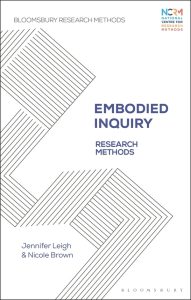
Book: Embodied Inquiry: Research Methods
Accounting for the interdisciplinary nature of the field, this book has been written to be a concise primer into Embodied Inquiry for research students, scholars and practitioners alike.
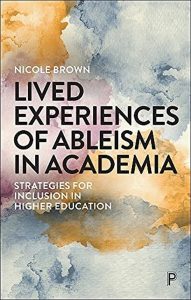
Book: Lived Experiences of Ableism in Academia
Deeply embedded in personal experiences, this perceptive book provides examples for universities to develop inclusive practices, accessible working and learning conditions and a less ableist environment.
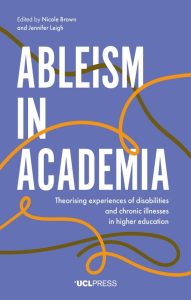
Book: Ableism in Academia
The book "Ableism in Academia" provides an interdisciplinary outlook on ableism that is currently missing. Through reporting research data and exploring personal experiences, the contributors theorise and conceptualise what it means to be/work outside...